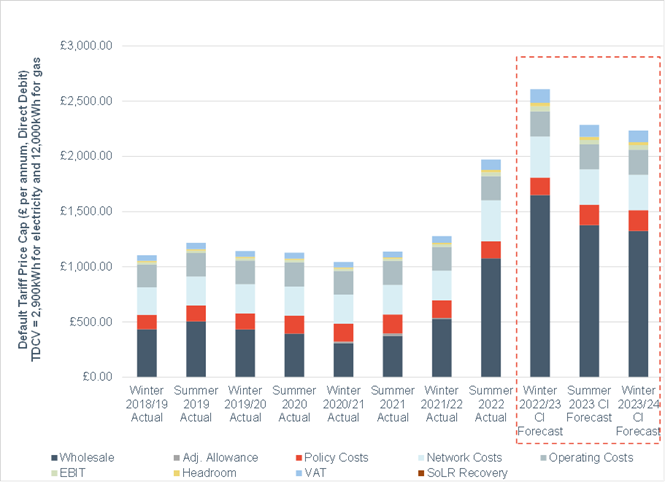Cornwall Insight’s Default Tariff Cap predictions for the Summer 2023 and Winter 2023/24 periods have risen by 15% in just two weeks. The figures, compiled from data as of market close on 12 April, show predictions of £2,284 (£2,040 30/03) and £2,233 (£2,001 30/03) respectively for the two periods, representing a sharp increase in a relatively short space of time. The forecast for the Winter 2022/23 cap remains largely steady against our view from the end of last month at £2,607.
Many were hoping that the significant rise in the Summer 2022 cap and the predicted rise in the Winter 2022/23 cap would be offset by large drops in prices over the coming two years. The wholesale market curve has however started to level out, with energy prices for 2023 increasing once again. Whilst markets are volatile and the outlook can change, as we stand today this means the likelihood of a return to pre-2021 energy prices looks increasingly unlikely.
Figure 1: Cornwall Insight’s default tariff cap forecasts
| Winter 2022/23 CI Forecast | Summer 2023 CI Forecast | Winter 2023/24 CI Forecast | ||
| TOTAL | £2,607 | £2,284 | £2,233 |
Source: Cornwall Insight analysis
Cornwall Insight predicted the Summer 2022 price cap to within 3%, when it was announced in February.
Figure 2: Default Tariff Cap levels since 2018 and Cornwall Insight’s forecasts for the next three caps

Source: Cornwall Insight analysis
Dr. Craig Lowrey, Principal Consultant at Cornwall Insight said:
“In the space of just two weeks, predictions for the price cap levels due in the Summer and Winter of 2023 have jumped by over £200 a year for an average household. Of course, many of the variables which drive our forecasts can change before the cap setting periods for next year, but the risk is weighted to the upwards rather than downwards pressure on the price cap right now. And with costs of living rising, and inflation hitting a record high in March before the cap rise of April 1 feeds through, then even the potential for these sorts of cap levels to arise in 2023 will be concerning for hard hit households.
“The government’s energy strategy announced last week, laid out plans to change the fundamental makeup of the UK’s energy supply through increases in renewables such as nuclear and offshore wind. However, as the Secretary of State for BEIS pointed out himself, none of the policy announcements will help domestic consumers in the short-term, with much of the plan unlikely to yield results for the next decade. While we should welcome the potential for bills to reduce years down the line, this is of little consolation right now.
“The cheapest energy is that which you don’t use, so to reduce bills for consumers, the government really must look again at how to support reductions in energy consumption for all consumers, including those in fuel poverty. The exclusion of material new policies for energy efficiency in the Energy Security Strategy were a missed opportunity
“While the government has already offered some support for consumers to pay their energy bills this year this was before forecasts began predicting further rises, and over a longer period. It is possible the government could take further action in the Autumn, but we have no guarantees that further support will be forthcoming. With the price cap yet again demonstrating its poor ability to protect households from higher energy costs, our predictions highlight the need for a more enduring solution if the objective is to ensure domestic energy costs are fair, and sustainable.”
–Ends
Notes to Editors
For more information, please contact: Verity Sinclair at v.sinclair@cornwall-insight.com
To link to our website, please use: https://www.cornwall-insight.com/
About the Cornwall Insight Group
Cornwall Insight is the pre-eminent provider of research, analysis, consulting and training to businesses and stakeholders engaged in the Australian, Great British, and Irish energy markets. To support our customers, we leverage a powerful combination of analytical capability, a detailed appreciation of regulation codes and policy frameworks, and a practical understanding of how markets function.

